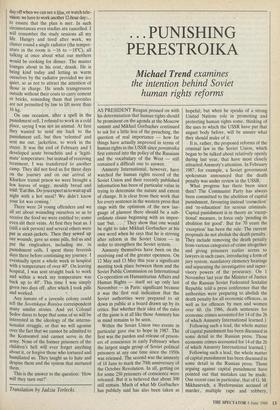. . . PUNISHING PERESTROIKA
Michael Trend examines
the intention behind Soviet human rights reforms
AS PRESIDENT Reagan pressed on with his determination that human rights should be prominent on the agenda at the Moscow summit and Mikhail Gorbachev continued to ask for a little less of the preaching, the question of real importance — how far things have actually improved in terms of human rights in the USSR since perestroika first entered into the policy of the Russians and the vocabulary of the West — still remained a difficult one to answer.
Amnesty International, however, have watched the human rights record of the Soviet Union and their recently published information has been of particular value in trying to determine the nature and extent of change. It is clear from their work that for every sentence in the western press that rings with the optimism of the new lan- guage of glasnost there should be a sub- ordinate clause beginning with an impor- tant 'but. . . .' They show that one would be right to take Mikhail Gorbachev at his own word when he says that he is striving after reform in the Soviet Union — in order to strengthen the Soviet system.
Amnesty themselves have been on the receiving end of the greater openness. On 12 May and 13 May this year a significant meeting took place between them and the Soviet Public Commission on International Co-operation on Humanitarian Affairs and Human Rights — itself set up only last November — in Paris: significant because it was the first real indication that the Soviet authorities were prepared to sit down in public at a board drawn up by its critics. But whether their idea of the rules of the game is at all like those Amnesty has in mind remains to be seen.
Within the Soviet Union two events in particular gave rise to hope in 1987. The first was the pardon and release of prison- ers of conscience in early February when the largest single group of Soviet political prisoners at any one time since the 1950s was released. The second was the amnesty of 18 June to mark the 70th anniversary of the October Revolution. In all, getting on for some 250 prisoners of conscience were released. But it is believed that about 300 still remain. Much of what Mr Gorbachev has publicly said has also been taken as hopeful; but when he speaks of a strong United Nations role in promoting and protecting human rights some, thinking of the uses to which the USSR have put that august body before, will be unsure what they should make of it.
It is, rather, the proposed reforms of the criminal law in the Soviet Union, which began to be talked about relatively openly during last year, that have most closely attracted Amnesty's attention. In February 1987, for example, a Soviet government spokesman announced that the death penalty was under review in the USSR. What progress has there been since then? The Communist Party has always been committed to the abolition of capital punishment, favouring instead 'correction' and 're-education' for serious criminals. Capital punishment is in theory an 'excep- tional' measure, in force only 'pending its abolition for good'. But for 70 years the 'exception' has been the rule. The current proposals do not abolish the death penalty. They include removing the death penalty from various categories of crime altogether and giving prisoners earlier access to lawyers in such cases, introducing a form of jury system, mandatory clemency hearings and separating the investigative and super- visory powers of the procuracy. On 1 November last year the Minister of Justice of the Russian Soviet Federated Socialist Republic told a press conference that the authorities were preparing to abolish the death penalty for all economic offences, as well as for offences by men and women over 60. (In 1986, death sentences for economic crimes accounted for 14 of the 26 of which Amnesty International learned.) Following such a lead, the whole matter of capital punishment has been discussed in some detail in the Russian press. Those economic crimes accounted for 14 of the 26 of which Amnesty International learned.) Following such a lead, the whole matter of capital punishment has been discussed in some detail in the Russian press. Those arguing against capital punishment have pointed out that mistakes can be made. One recent case in particular, that of G. M. Mikhasevich, a Byelorussian accused of murder, multiple rape and robbery, attracted widespread attention. The press revealed that 14 innocent people had already been wrongly convicted of his earlier crimes. The argument was clear: that the legal and administrative machinery of the Soviet Union can be so bureaucratic that gross injustices may occur.
The question of the possible abolition of internal exile as a criminal punishment has also been aired. On 9 November the Minister of Justice of the USSR, B. V. Kravtsov, told a press conference in Mos- cow that Soviet legislators were consider- ing this. Internal exile ranks as the third most severe penalty after the death penalty and imprisonment and involves being re- moved far from home, being restricted in one's movements, obliged to work and undergo political education. Such has re- cently been the fate of, for instance, Balys Gayauskas who has spent a total of 35 years as a political prisoner, most recently at Chumikan near the Pacific coast some 9,000 kilometres from his wife and child who live near the Polish border. He was last arrested in 1977 on a charge of translating Solzhenitsyn's Gulag Archipela- go. The argument for 'simplification' of the law has been heard again here; but 'simpli- fication' of any code or practice of law can cut two ways.
Another potentially encouraging sign was seen on 1 March this year when a new statute on psychiatric confinement became law. The new law dismantled the network of special psychiatric hospitals that were run by the Ministry of Internal Affairs and integrated them within the Ministry of Health. The right to appeal with legal aid was given to people who had been arrested without criminal charge and faced with forcible psychiatric confinement. Moreov- er, anyone who wilfully confines a mentally healthy person in an institution now risks imprisonment of up to two years. It also requires psychiatrists to disclose their identity to a person under examination. The official news agency TASS described the new law as providing 'guarantees against errors and malpractice'. The extent of former use of the earlier practice was shown in one dramatic statistic. The new law abolished obligatory registration of those who had been released from psychiatric hospitals, reportedly striking two million people from the register.
But there are problems here too. The new law leaves scope for compulsory con- finement to continue on solely political grounds, so it is not intended to prevent individuals from being confined in psy- chiatric hospitals for political or religious dissent.
And it is in the area of religious free- doms that, so far, any real progress to- wards a more liberal regime has been slowest. When I visited the Revd Michael Bourdeaux's Keston College, which studies religious persecution, just before last Christmas there was already a general note of increased optimism; but also a strong desire to see not just gestures on the part of the Soviet authorities — of which there have lately been many — but fundamental changes in Soviet law — of which there have been none. There are still a large number of cases of religious prisoners of conscience on Amnesty International's books, especially from within those reli- gious groups who do not have the same nationalist interest as the Orthodox — Pentecostalists, Jehovah's Witnesses, Mos- lems and devotees of the Hare Krishna cult, among others. The celebrations of the Christian millenium in Russia will be held within a legal framework which effectively limits the rights to religious assembly and proselytisation and discriminates against Christians and other religious groups in many other ways. Reforms based on attacking bureaucratic inefficiency and cor- ruption in the state's own apparatus are one thing; moving on to allow greater human rights to bodies not immediately within the control of the state is another. Perestroika is concerned with efficiency, not freedom.



















































 Previous page
Previous page